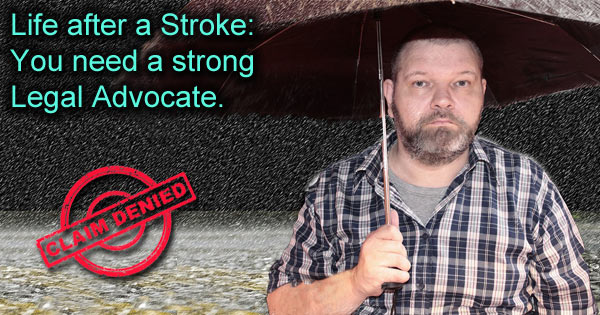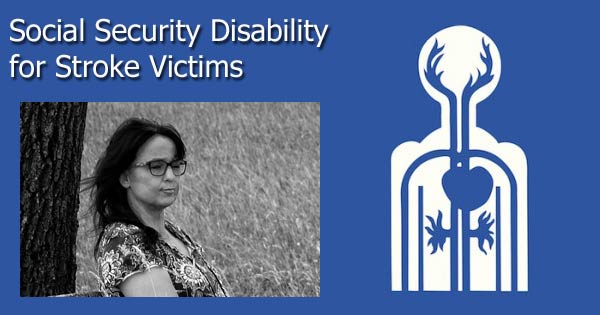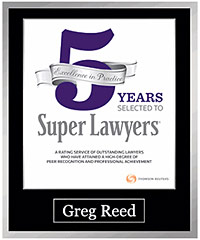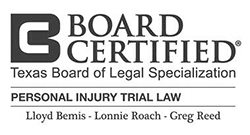Strokes and Qualifying for Disability Benefits
Can I get disability benefits if I am suffering from the effects of a stroke?
Author: Attorney Greg Reed
Updated: 3/7/2023
More than 795,000 Americans suffer a stroke each year. Also called a cerebrovascular accident or CVA, stroke is the No. 5 cause of death in the United States and a leading cause of disability. Though the risk of stroke increases with age and more than half of stroke survivors are 65 or older, a stroke can happen at any age. If you are suffering from the effects of a Stroke you may qualify for disability benefits.

If you are suffering from a stroke and have been denied disability don’t give up, almost 70% are denied initially! Just call 512-454-4000 for a free, no obligation consultation to learn what your options are.
Can I Qualify for SSDI if I Have a Stroke?
A stroke occurs when blood flow to the brain is blocked.
The brain needs a constant supply of oxygen and nutrients; if blood supply is stopped even for a short time, brain cells begin to die. As brain cells die, brain function is damaged and a person may not be able to perform functions controlled by that part of the brain. Strokes can affect a person’s ability to move, speak, think, control emotions and other vital body functions.
I had a stroke and can no longer work – how can I qualify for SSDI?
A stroke can cause permanent or temporary damage, including paralysis, difficulty speaking or swallowing, memory loss, and depression.
A person may have trouble controlling their emotions or need help with daily tasks such as dressing. All these symptoms may prevent you from working and maintaining full-time employment. There are two ways to qualify for Social Security Disability Income: meeting the requirements of Social Security’s Blue Book listing for a CVA or having functional limitations that prevent you from working at any job.
Social Security recognizes CVA as an impairment in its Blue Book under Section 11.04 Vascular insult to the brain.
To meet the requirements of this listing, you must provide evidence that you are experiencing at least one of the following symptoms:
- Inability to communicate needs effectively or understand basic commands because of aphasia (extreme limitation to understand speech); OR
- Disorganization of motor function in two extremities, resulting in an extreme limitation in the ability to stand up from a seated position, balance while standing or walking, or use the upper extremities; OR
- Marked limitation in physical movement and in one of the following areas of mental functioning:
- Understanding, remembering, or applying information;
- Interacting with others;
- concentrating and maintaining pace; and
- adapting and managing oneself.
The above symptoms must be present three months after the date the stroke occurred.
Because it can be almost impossible to measure permanent limitations caused by a stroke in the time immediately following a stroke, Social Security waits three months before making a decision on whether or not an applicant is disabled.
Social Security will want to see the following medical evidence:
- Physical exam and notes from your doctor or neurologist, documenting long-term or permanent losses in coordination, speech, etc.
- Results of tests run to diagnose your stroke.
- Records from hospital stays, including emergency room visits.
- Medications you’ve taken and their side effects.
- Notes from surgeries you’ve undergone.
- Detailed reports from your doctor or neurologist regarding your long-term prognosis.
If you don’t meet the requirements of the Social Security listing, but your limitations prevent you from returning to work, you may qualify for disability benefits through a medical-vocational allowance.
Social Security will review your doctor’s notes, summaries of hospital admissions, lab results, and imaging to evaluate your physical and mental capabilities after a stroke. This is called a Residual Functioning Capacity (RFC) assessment. Social Security takes your doctors’ opinions seriously; make sure your doctors are aware of what you can and cannot do and includes this information in their notes:
- Whether you can walk upstairs.
- How long you can sit, stand and walk.
- Whether you can use your hands to button a shirt or type.
- If you have balance issues.
- If you have trouble speaking or reading.
- If you have difficulty understanding directions or remembering information.
Social Security will compare your RFC to physical and mental skills needed on your past jobs to see if you can perform them now and may consult a vocational expert to determine if there are any jobs you can still do.
Social Security might find that you are no longer able to work at your old job and that you do not have transferable skills to perform a different job.
Your age or another medical condition may help you get approval.
Social Security follows a set of rules to determine when the agency expects an applicant to learn a new job.
Applicants who are 55 or older often fall under a grid rule, which means they are not expected to learn a new job. For example, a 55-year-old applicant with no transferable skills might be found disabled. If you can’t go back to your old job, and you don’t have the skills to learn a new one, Social Security will likely grant you disability benefits.
You may also be eligible for Social Security Disability benefits if you have another impairment, such as arthritis or diabetes.
One disorder by itself may not meet the requirements of an impairment as stated in Social Security’s Blue Book, but if you have more than one medical condition, Social Security must consider how those health issues combined limit your ability to hold a job and perform necessary daily tasks.
You must also meet Social Security’s basic financial requirements.
Social Security has some basic financial requirements which you must meet before you are eligible for disability benefits.
You must: 1) have a disability that has lasted, or is expected to last 12 months; 2) you must have worked in a job where you paid Social Security taxes long enough and recently enough; and 3) you must not earn more than Substantial Gainful Activity (SGA), which is $1,550 per month in 2024 for nonblind applicants and $2,590 per month for blind applicants.
What if I don’t qualify for SSDI?

Strokes are one of the leading causes of disability. If you or someone you know has had a stroke and is unable to work, they may be entitled to Social Security Disability Insurance or Long Term Disability Insurance benefits.
If you haven’t worked long enough or if you earn too much income, you may be eligible for disability benefits through another Social Security program, like Supplemental Security Income (SSI,) or from long-term disability insurance through your employer or a privately purchased policy.
SSI is a program that pays monthly benefits to people with limited income and resources who are disabled, blind, or age 65 or older. SSI is based on income instead of work credits, and is financed by general funds of the U.S. Treasury.
I have long-term disability insurance – should I file a claim?
Long-term disability insurance (LTD) is coverage to protect your income if you are unable to work due to illness or injury and is purchased as part of a group employment plan or privately through an insurance company.
Policies pay between 50-60% of your salary and benefits continue until you return to work or for the number of years stated in the policy. Remember, LTD coverage is good only as long as you are employed, so do not quit your job before you file a claim. Be sure to check your policy’s definition of “disabled” as each policy will state the definition of “disabled” which is in use. Note that long-term disability insurance companies can require a claimant to also apply for SSDI.
How do I file for Social Security Disability benefits?
You can apply for Social Security Disability benefits online, over the phone, or in person at your local Social Security Administration office.
If your application is denied, do not be discouraged – most initial applications are; you will have the opportunity to appeal. There are four steps to the Social Security appeal process:
- File a Request for Reconsideration with the Social Security Administration to completely review the case.
- If you don’t agree with SSA’s response to your Request for Reconsideration, you can request a hearing before an Administrative Law Judge (ALJ). ALJs are attorneys who work for the Social Security Administration; they review SSDI cases and either uphold or overturn decisions to deny SSDI benefits. If you are not represented by an attorney, you should obtain legal counsel at this critical point to raise your chance for success.
- If an ALJ does not grant your claim, you can request that the Appeals Council review your case.
- Federal Court review. The final step in the appeal process is filing suit in U.S. District Court.
Do I need a disability attorney for an SSDI claim?
If you have had a stroke and cannot work for at least 12 months, you may be eligible for Social Security Disability benefits.
However, applying for SSDI is a long process that can take several months to years, and your chances for approval are increased significantly if you have legal representation. At the request for reconsideration and hearing levels, an attorney can collect and submit relevant medical evidence, obtain doctors’ opinions, draft a brief to the ALJ, and prepare you for questioning by the judge. An attorney can also prepare you for testimony and cross-examine vocational and medical experts to demonstrate your inability to work. At the Appeals Council and federal court level, a lawyer can present legal arguments to show your case was wrongfully denied. Fees charged by disability attorneys are regulated by federal law and are usually 25% of disability backpay you are owed. There are no out-of-pocket costs, and if you don’t win your case, you won’t be charged anything.
If you are suffering from the effects of a stroke and have been denied disability don’t give up, almost 70% are denied initially! Just call 512-454-4000 for a free, no obligation consultation to learn what your options are. Have some questions? just give us a call, we love to help folks just like you!
Do I need a disability attorney for an LTD claim?
Filing a claim for long-term insurance if you become too disabled to work is a complex process, whether you have a long-term insurance policy purchased through a private insurance broker or a group policy purchased with your employer.
The wording of policies can be confusing and the laws and regulations which affect the two types of LTD insurance differ in their procedures for filing claims and appeals. An experienced LTD attorney with thorough knowledge of ERISA laws and regulations will avoid mistakes and increase your chance of success. An attorney will act on your behalf, completing your application and filing your claim in a timely manner. They can also negotiate a settlement or file an appeal for you. If it becomes necessary to file suit, an LTD attorney can prepare your case against an insurer. Most LTD attorneys handle cases on a contingency basis and charge approximately 25%-40% of a claimant’s past due benefits. You do not pay an attorney’s fee unless the attorney wins your case.
At The Texas Disability law firm Bemis Roach & Reed, our attorneys are committed to helping injured or disabled clients receive the benefits they deserve. Mr. Roach is AV Preeminent and SuperLawyers rated and has become a recognized leader in the field of Long Term Disability law. Mr Bemis focuses his practice on Social Security disability while Mr Reed handles both LTD and SSDI claims. Both are AV Preeminent and SuperLawyers rated and all our attorneys have been successfully helping people fight for their rights against big insurance companies and the government since 1993. If you have applied for benefits and been denied call 512-454-4000 for a free consultation and get help NOW.
Brain Aneurysms and Qualifying for Social Security Disability Benefits
Misdiagnosed Stroke – You could be in danger
Prudential and filing Long-term Disability Insurance Appeals
Author: Attorney Greg Reed has been practicing law for 29 years. He is Superlawyers rated by Thomson Reuters and is Top AV Preeminent® and Client Champion Gold rated by Martindale Hubbell. Through his extensive litigation Mr. Reed obtained board certification from the Texas Board of Legal Specialization. Greg is admitted to practice in the United States District Court - all Texas Districts and the United States Court of Appeals-Fifth Circuit. Mr. Reed is a member of the Travis County Bar Association, Texas Trial Lawyers Association, past Director of the Capital Area Trial Lawyers Association, and an Associate member of the American Board of Trial Advocates. Mr. Reed and all the members of Bemis, Roach & Reed have been active participants in the Travis County Lawyer referral service.
Your Free Initial Consultation
At Bemis, Roach and Reed, if we can't help you, we will try to find the right attorneys for you.
We offer each of our prospective clients a free no obligation one hour phone or office consultation to see if we can help you and if you are comfortable with us. We know how difficult a time like this can be and how hard the decisions are. If we can be of assistance to you and help you find a solution to your issue we will even if that means referring you to another attorney.
Or simply call
512-454-4000
to schedule your
Free Consultation
Let's get you Started:
If you could provide us with some basic information about your claim we will get right back with you with a free case evaluation and schedule your Free Consultation Today.










